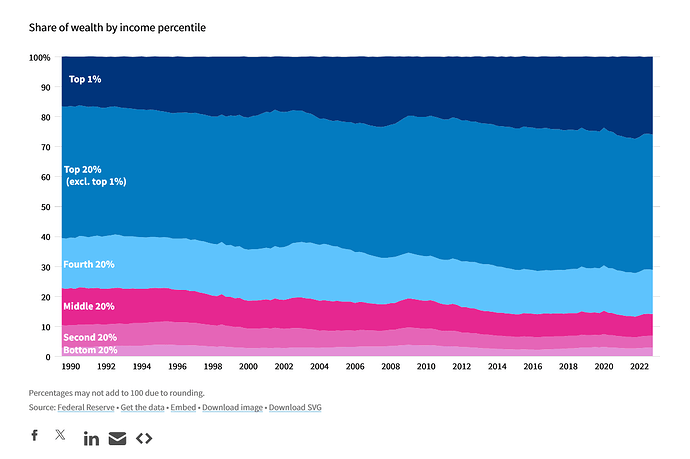No it’s not man. I did this shit too, through the Great Recession. It’s not a representative sample
This local economy stuff seems new. IIRC, you were saying that the national economy wasn’t as good as all the positive stats would have one believe.
It doesn’t have to be a representative sample to identify trends, it just has to be a sample that maintains a correlation to the local economy.
It wasn’t, still isn’t. The stats do not capture normal people’s reality.
This is absurd man. The first thing you do with a dataset to see if it can be used for analysis is to see if it’s representative.
Anyways, the facts are clear right now:
The US economy is great using any sort of historical comparison
The US economy is stronger than any other major country right now
It’s hard to find this data every month, seems to pop up every now and then when they release the full numbers. Regardless, I doubt that these types of metrics are looking great by historical comparison right now.
It depends how you’re using the dataset. If you’re trying to reach broad conclusions about directional trends, you don’t need it to be representative, you just need it to be correlated and maintain that correlation.
Replying here because I don’t want to turn that other thread into this one.
Those pink bars ain’t getting bigger:
That is measuring something different. The economy isn’t a zero sum game, and real wage growth has been substantial the past four or so years in the lower to middle quintiles. Well established itt.
What you believe about the economy comes down to do you use widely accepted statistics in a historical context to evaluate the economy or do you use something else. If it’s the former, the economy is good.
It comes down to do you trust the elites to accurately depict the conditions of the working class or do you not.
This reference predates you, but ok jiggs.
This is not a serious, or falsifiable response
Yeah no idea what ok jiggs means. Let me rephrase my response to make my point more obvious. In AP Stats I learned that it’s really easy to manipulate data and statistics to tell the story you want to tell. Give me GDP growth and the ability to decide how we’re going to bunch up the numbers, or give me wage growth numbers and the ability to decide how we’re going to make up the basket of goods for inflation calcs, and I can tell any story that you want me to tell.
I’m gonna say let’s not rehash this argument between you two. Just my opinion.
I’m inclined to agree with this take.
I agree that younger people now may have more challenges than their parents, especially wrt student loan debt and housing affordability.
But on an absolute scale, the bottom 50-60% of Americans in this country have iPhones, safe and reliable used cars, Wi-Fi, and no food insecurity.
It’s a historically unprecedented thing that waaaaaay more people in this country die from complications of obesity than starve to death.
Here’s what I mean by an absolute scale.
The other day, I got sooooo tilted by the local weatherman. The seasons are changing, and he said that we went from a low in the 40’s (Fahrenheit), to a daytime high in the mid 70’s (Fahrenheit). The temperature almost doubled, in just 24 hours!
If you zoom out and look on an absolute scale, it went from like 285 K to 300 K. Far from “doubling.”
I think the two of you have a BIG disconnect regarding what you think of economic progress on a relative scale, vs. an absolute scale.
You’re both not wrong, and this is the source of all your disagreements.
I would argue that the bottom 60% or at least the 20th through 60th percent have it worse than at any point since The New Deal, that those people currently are doing worse than their parents and perhaps grandparents, and that housing affordability is one of the key factors in upward mobility and wealth accumulation in recent American history.
I mostly think of it in terms of expectations that had been established for American middle/working class folks and generations based on recent history. I think the comparison of like being poor today but having an iPhone and HD TV is extremely hard to quantify since people 50 years ago didn’t know what they were missing, and the same is true of us going forward. Also some of that tech has drastically increased stress levels and injected a lot of chaos into society lately.
nobody is disputing that the bottom X% is better off now than in the past, nobody is actually suggesting the poorest people had it better whatever number of years ago, that point is completely dodging the issue
- Yes they are
- If your opinion requires that every single economy in all of time is bad, that can be your opinion. It’s kind of an absurd position though. No one disagrees with the idea that things can/should be better. You don’t have to pretend like things are bad in order to say things can be improved.
Things are better now for the bottom X%? I could have swore a single earner in a 4 person household with a high school diploma used to be able to support his family’s solid middle class lifestyle.
- White people
- No, not all white people.
I get the argument that things are better for a poor person in America today than it was for a poor person in 1842, or even that it is better than in 2010 or 2020 or whatever.
But something can be both better and yet still bad right?
